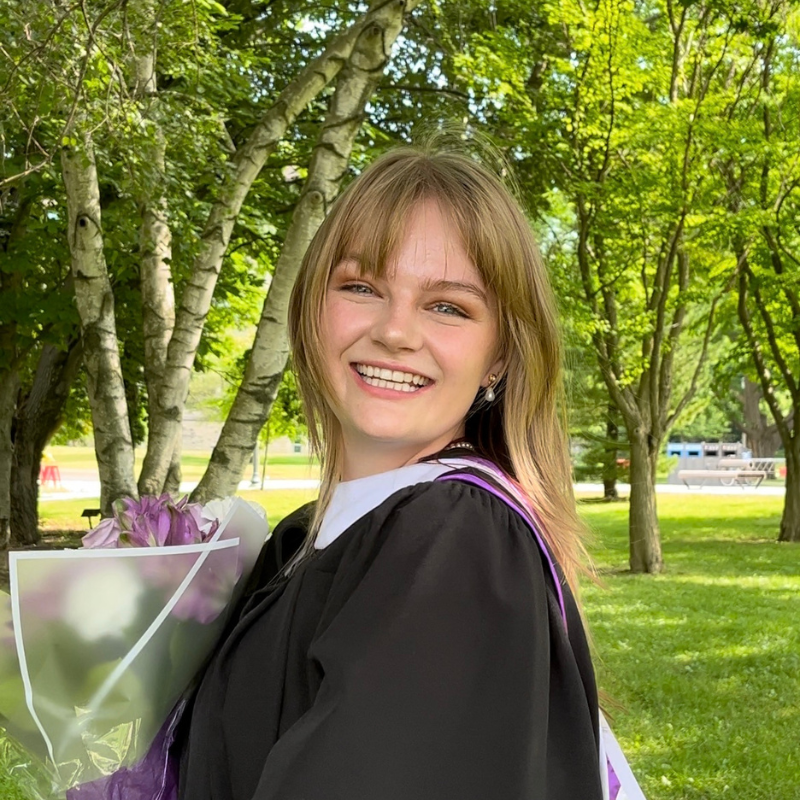Search Website
QUICK LINKS:

Faith Caswell
Class of 2025, Graduate Student
Faith Caswell
Class of 2025, Graduate Student

Faith Caswell
Class of 2025, Graduate Student
What was your degree and academic path at Western? How did Scholar’s impact your academic trajectory?
When I began my undergraduate degree in 2020, my Scholar’s Electives class was the only class I had live, in person. Not only was the face-to-face learning instrumental to my development as a new university student, but the Scholar’s community did wonders for my mental and emotional wellbeing. Feeling supported—socially and academically—in the first year of Scholar’s Electives impacted my growth within the program because I felt free to explore the diverse range of interests that were fostered through the interdisciplinary first-year course. With the help of a wonderful supervisor, Dr. Joel Faflak, I completed two separate research projects in the second and third years of the Scholar’s program; these projects allowed me to pursue interests adjacent to my main course of study, English Literature, while honing my research skills. Even while I was on exchange at the University of St. Andrews in my third year of undergraduate, I was able to pursue my research with the support of my Western supervisor and Scholar’s Electives program directors. The community engaged learning experience in the fourth year of the program provided an opportunity to get hands-on experience in London (ON); our team researched funding access and wrote grant requests for The Salvation Army’s addiction recovery centre. I can’t imagine my undergraduate study without the Scholar’s program.
What did you do after Western and where are you now?
I have just graduated with a Master of Studies from the University of Oxford, and I cannot say that it would have been possible without the learning, research, and engagement opportunities provided by the Scholar’s Electives program. This year, I have worked as Deputy Editor for a student newspaper, organised a graduate student conference, interviewed some of my favourite authors such as Sir Stephen Fry, and had the chance to pursue a multitude of academic interests. I am currently the music director for an a cappella group preparing for the Edinburgh Fringe Festival, as well as teaching a summer school course in English Literature at Oxford University.
How did you stay involved/active in your community after graduation? What kept you competitive?
Although I am now living in the UK, I keep in touch with a number of friends from Western. I look forward to the fortnightly calls with my best friend and undergraduate housemate, who is currently thriving in medical school. My sister is entering the second year of her music performance degree at Western, and it has been a joy to re-experience the early days of university vicariously through her. While it has been many months since my last visit with any of the professors who made a huge impact on my academic trajectory, the occasional email exchanges throughout this past year have reminded me of how fortunate I am to have learned from such attentive, dedicated, and caring teachers. Although the connectivity sometimes feels stretched with distance, my relationships with people from Western remain some of the most valuable in my life.
The Scholar’s program encouraged me to expand my intellectual horizons and dive into topics outside of my typical purview. This year, for example, I have pushed myself to research the intersection of AI and the arts. Excitingly, I have been invited to travel to Beijing and Bali in the fall to present at an interdisciplinary conference hosted collaboratively by Oxford University and Tsinghua University on the subject of AI and Humanity.
Despite my master’s degree being in nineteenth-century English literature, I have found that there are ways to shape your research to remain current and competitive. My studies in literature have not limited my career prospects, but enhanced them. My first year in Scholar’s Electives showed me that studying the arts and humanities was a strength, and that an openness to interdisciplinary research can make your work more meaningful and impactful.
What is your advice to a young Western Scholar?
Step outside of your comfort zone! Take on challenges and don’t be afraid to make mistakes or get things wrong. The best experiences I had in the classroom were when I first misunderstood something, but then had a “eureka!” moment. The lightning-flash of discovery, the spark of a new idea, comes at times when you’re least expecting it. Scholar’s Electives is consistently made up of hard-working, bright individuals, and the best thing you can do whilst being a part of this fantastic community is to submerge yourself in it completely. You will get as much as you give, I promise.
Start your journey.